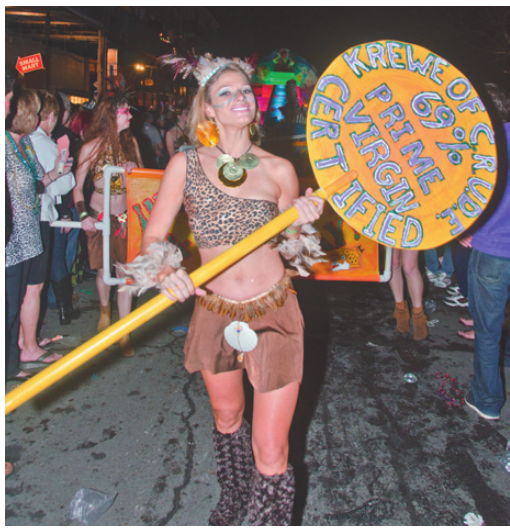
As a holiday and a tradition, Mardi Gras has been celebrated in New Orleans as far back as 1699. Although it wasn't declared a legal holiday until 1875, the traditions have held strong throughout most of whatever life could throw at us. In fact, in most years of distress, Mardi Gras in New Orleans has fl ourished. The only thing that has been able to break the celebratory tide has been our country's participation in a large-scale war. Although citizens of New Orleans have a longstanding history of maintaining soiree-style satisfaction, history seems to suggest that the only thing that can stop us is, well a lack of people to celebrate with.
Mardi Gras was first officially cancelled from 1861 to 1864 due to the United States Civil War and New Orleans unfortunate, yet crucial battle front location. According to The American Battlefi eld Protection Program (ABPP), throughout the course of the Civil War, Louisiana was the site for at least 23 documented battles, with a total of 27,425 combined estimated casualties. Due to the lack of records available, the true number of deaths cannot be confirmed. With a city and culture based heavily in extravagance, it's quite difficult to believe that during one of the city's most trying times, the people chose not to drown their sorrows. historian and author reid Mitchell expounds upon this preponderance by stating that although no offi cial parades took place, celebration in fact still occurred, although it would be socially improper and even shameful for anyone to have admitted it. The prompt resurgence of Carnival in the post-war age was proof that although our people and our land took a hit, there was no stopping New Orleans from having a little (or even a lot of) fun. Even the Prohibition and the Great Depression couldn't hold back the city from having a good time throughout the 1920s and 1930s.

All in all, Mardi Gras exists not simply as a once-local, now international momentary reprieve, but also an unmatched economic stimulus for the city. According to Mint.com, a web-based personal fi nance service, the average fi nancial infl ux attributed to Mardi Gras is as follows:
Lodging: $106 million
Food: $2.5 million
Alcohol: $3.4 million
Merchandise and Services: $5.9 million
Krewe Expenditures: $24.6 million
Aside from the raw data, Mint.com calculates an estimated net brand value of upwards of $429 million in 2011, with a total of $13 million net fi scal benefi ts for the city. Considering the two-week offi cial Mardi Gras celebration, that's a little less than one million dollars a day. A study conducted by Tulane University reports that for every public dollar spent, New Orleans received a gain of $4.48 in 2010, which accounts for 1.61% of the city's GDP. updated in 2011, the study reported ringing in a per-dollar return on investment of $8.45, which is signifi cantly higher. While the results of economic impact studies are occasionally debated, the fact of the matter is simple. New Orleans's economy and people depend highly on tourism and the money it brings in. In a city built for visitors, our tourism bureau boasts occupancy rates as high as 97.8% during Mardi Gras. Although Mardi Gras or carnival season only lasts a few weeks, the economic impact of Mardi Gras season and it's festivities lives on throughout the year.
With an exponential amount of valuables, it would be difficult for even the most skilled statistician to properly portray the fiscal impact of a festival this size. The difficulty does not come in the scale of the festival, or even the sheer chaos that ensues, but rather the incalculable variables such as local contributions, grassroot parties, small-scale krewe gatherings and festivities, and what I like to call the house guest imperative. The largest hurdle standing in the way of a sound economic study of Mardi Gras and that is our love for Mardi Gras itself. Let's be honest, we've never been a people concerned with how much it would cost us to have a good time. Tickets are not sold, admittance not capped. There are no receipts or line items in this event. So, we must resign ourselves to the fact that as long as there is a demand, the city and the people of New Orleans will do whatever it takes to ensure the supply is above and beyond expectations.
Our city's most celebrated and notorious holiday has withstood the torments of war, storm, civil unrest, occupation, prohibition, and even depression. history suggests that although there may be a momentary pause in our magnanimous revelry, it not only takes a lot to stop us, but even then it doesn't last long. It can all be reduced to the following: if we can celebrate, we will. No bad news, sad song, or empty pocket can keep New Orleanians and our international visitors from continuing our 300+ year tradition of leaving all worries behind and losing ourselves in the festivities, even if just for a little while. Sure, New Orleans depends on the money brought in from tourism and celebration. All rational thought would suggest that as the international economy declines, subsequently so would our festivities and thus our profi t. unfortunately, for the economists and statisticians, we as a city have time and time again defi ed logic. With over 300 years of history proving wartime the only real threat to our pre- Lenten celebration, it's safe to say that if we want Mardi Gras to last forever, the solution could be quite simple: Make Floats Not War.

